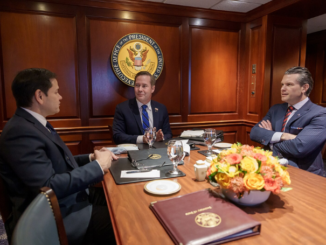
By Jim Miles
One of the more pivotal years in modern history was 1979 and its geopolitical events. Until recently I had considered them to be the most important alignment of events influencing future actions. It is still of paramount importance in the hindsight of history, but events of our most recent year, 2020, will probably highlight another set of significant changes. These changes will occur in seemingly disparate genres as climate change, financial and economic relationships, and military alignments.
Two of the biggest factors in these are the arrival of a global pandemic and the last year of the Trump presidency. The former highlighted the ill-preparedness of ‘modern’ countries to handle such a pandemic with the resulting economic and geopolitical turmoil it generated. The latter, the Trump presidency, revealed the ugly underside of the beast that is the US empire and all its moral failings, domestic and international.
1979
In 1979, three important changes took place affecting the larger geopolitical shape of the world for decades to come.
The Camp David Accords were signed, providing vague hopes for a two-state solution to the intractable problem of the occupation and settlement of Palestine by Israel. For many years afterward, negotiations and discussions of various scale were undertaken, while Israel continued building settlements beyond the ‘green line’ established after the 1948 nakba. Its essence allowed Israel to continue its colonial-settler project while continually denying any agreement with the imposed Palestinian Authority, relegating it to a means of controlling the Palestinian people.
Late in the year, Soviet forces entered Afghanistan in order to assist the socialist government of the time maintain its ability to function. The intervention became, as the US under National Security advisor Brzezinski wished, the Soviet Union’s Vietnam.
This lead to nine years of warfare during which the CIA and other US operations and the assistance of Pakistan helped the development of the mujahideen, Ronald Reagan’s famous “freedom fighters” who later morphed into the Taliban (and many other warlord groups) and on into al-Qaeda, and ISIS and now into a variety of terrorist groups supported by Turkey, Saudi Arabia, the U.S., and other countries from the EU and the Gulf States.
The third major event of this pivotal year was the overthrow of the Shah of Iran – a US CIA supported government – and the rise to power of the Ayatollah Ruhollah Khomeini. This developed into the Carter-Reagan hostage-taking and its effects on the 1980 U.S. elections. After that, the U.S. and its ally Israel have maintained an ongoing effort to destroy the government of Iran through open war and various subversive operations. The open war did not involve the U.S. or Israel directly, but was the war between Iraq and Iran, initiated by Iraq, during which both sides were aided in their efforts to defeat the other, operating on the idea of letting them beat each other into irrelevance.
Those events created the origins of much of what has occurred in the Middle East and South Asia and indeed throughout the world. The Soviet Union eventually collapsed, partially under the burden of its Afghan war but also its economic and political inefficiencies. After a decade of Yeltsin’s corrupt government under the aegis of US economists and corporate profiteers, Vladimir Putin began modernizing the shrunken state of Russia. Major wars and operations destroyed much of the political and civilian infrastructure of the Middle East while US covert and overt actions continued in Latin America and Africa.
2020 – Tipping Points
It may not be evident yet, but in another ten or twenty years, the year 2020 may also be looked on as a pivotal year in global interactions – geopolitical, environmental, and financial – all of which are highly interrelated.
Imagine the lowly teeter-totter, a playground piece not as common as it used to be. The teeter-totter is aptly named as many a child, and many an adult has stood above the bar that makes the plank teeter and totter, trying to maintain balance but also testing how far they can go before touching down on one side or the other. Now imagine that teeter-totter is poised on the edge of a cliff, where one side can touch down and avoid the unknown drop, and the other side obviously is the drop from which there is no recovery to equilibrium.
It is a simple metaphor, but it illustrates for several sectors of our lives, we have allowed ourselves to drop into the unknown.
The unknown is simply the future. This future is to be determined by a declining global economy becoming saturated with massive US money printing to prop up the banksters and corporate CEOs. It will be determined by the disregard domestically and in foreign affairs for the supposed ‘rule of law’ but more importantly international law and true justice for all people. The changes to our environment are at the moment relatively slow but are becoming irreversible under current trends. Finally, the massive military investments on a global scale for both nuclear and conventional weaponry threatens everyone with a very delicate balance of power.
COVID-19
The main event of the year was the global COVID-19 pandemic. It had enormous impacts around the world, with the largest effect highlighting the poor condition of the United States in general. Along with other ongoing things in the US, the pandemic displayed the poor state of healthcare in the US as hundreds of thousands per day were becoming infected, and over 230 thousand have died (as of this writing) with an average death rate of one thousand per day. Even if one can accept it as a particularly infectious disease, several other implications can be carried forward other than poor health care.
The majority of people dying – apart from the already weakened elderly – tend to be African-American and Hispanic, a trend that has nothing to do with genetics and much to do with racism and poverty. Racism and poor economic opportunities go hand in hand, and poor economic opportunities affect lifestyle habits such as food quality and access to health care.
Not only were these people hit hardest by the disease, but they were also one of the hardest-hit groups of workers in the service sector, adding further distress to an already poor societal position.
Along with the racism, poverty, and a poor health care system highlighted by the disease, the incompetence of the different levels of government should have been obvious to observers. The initial responses were uncertain and confused both by the poor health system, but also by the denial and initial lack of comprehension of the virus’s seriousness by local and national officials. Above all, the COVID virus met up with another level of utter incompetence, the Trump presidency.
Presidential Election 2020
It is hard to know which had the worst effect, the virus or President Trump. Trump has shown himself to be narcissistic to the extreme, misogynist, racist, xenophobic and essentially uncaring about anything that did not pander to his need for attention. His lack of intelligence – not that he isn’t a crafty manipulator of the media in his own right – and lack of critical thinking skills combined with his psychopathic personality created the perfect political and structural environment for the virus to devastate the lives of so many people.
Thus the second main event of 2020 was Trump’s reaction to the virus, but more importantly his defeat in the presidential elections (at least as of this writing – there are still seventy plus days to go until he is officially out). Regardless, the Trump effect will carry on for a while.[1]
The Trump effect has a good side in a macabre sort of way: The good component is that the ugly side of the US, which has always been there, somewhat subdued but nevertheless very real, has been exposed for what it is, for all the world to see and hopefully realize that the U.S. is no paragon of democracy, freedom, nor liberty. It ranges from Pompeo’s declaration about the CIA, “We lie, we cheat, we steal” to the Proud Boys new logo “Stand down, stand by.”
The bad component is the very same – the ugly side has been revealed and is very unlikely to be subdued again without significant changes to the US system. With this electoral season almost past, and because of its enormous impact on the world due to its economic and military clout, it seems we are at the point of no return in several areas.
The flip side is that a Biden win will not erase the domestic mayhem created – mostly by the agitation of systemic racism. [2] Another significant factor is the continued catering to the oligarchs as the Federal Reserve continues money printing and low-interest rates to essentially help the rich get richer while the poor remain poor. Neither of these factors are Trump’s fault as both existed well before his reign of narcissism; they were highly exacerbated by his actual lack of policies and actions derived only to stimulate his ego.
Nor will Biden ease the international situation. If his record continues the actions of the Obama government he was part of and he continues to use all the neocon Warhawk advisors of that era, the international situation – while promoted in kinder gentler words – could also produce harsher and uglier actions.
Until Debt Do us part: Global Economic Outlook
Under the Trump presidency, combined with the economic impact of the virus and actions to contain it (for better or worse, not a point of discussion here), the US has assuredly reached a point where its huge national debt can never be repaid. Combine this with the main source of income and wealth in the US no longer being production, but financialized services simply creating money at the stroke of a keyboard and the economy is surviving precariously on the whim of people servicing the US$.
Put simply, the US survives on the Federal Reserve Bank (a consortium of private banks) pumping money into the economy. With much of the economy based on debt, and interest rates kept necessarily low in order to service the debt, the strength of the US$ as a global reserve currency – the petrodollar – is jeopardized.
What keeps the US$ alive is its role as the global reserve currency. With agreements from some oil-producing countries, oil is priced in US$ and thus most countries require US money in order to carry out international transactions. Also operating in the US$’s favor are the global financial institutions controlled directly or indirectly by western corporate financiers: the International Monetary Fund, the World Bank, the Bank of International Settlements, the Society for Worldwide Interbank Financial Telecommunications (SWIFT – through which all global financial transactions in US$ pass through) and on. This assists the US tremendously in placing sanctions on companies and individuals in order to cripple their financial resources and thus their systems of operation.
Counteracting that influence are the systems created by China and Russia in order to avoid using the US$. This makes sanctions ineffective to the degree that others are slowly buying into these alternate programs.
When the necessity of printing endless amounts of money to support the domestic dollar, heading in the direction of inflation to hyperinflation, combines with the rest of the world’s desire to disentangle itself from a depreciating dollar and its political influence, the dollar could quickly lose the global reserve status it now holds. This is a simplification and there are many factors involved in this making for an uncertain timeline, but eventually, the US$ will inflate its way into uselessness.
There is little recourse – the financialized economy is well past the tipping point of maintaining its long term stable reserve status.
The Tip of the Iceberg
The environment is not generally considered a geopolitical topic and for most individuals. What they do not connect are the relationships between our economy, our support for the military and the consequences for that on the environment. In part, this is another area exacerbated by Trump and his lack of scientific knowledge or processing skills. His not quite denial of climate change, his actions on deregulating many industrial controls, and his opening up of more lands and wilderness areas to exploitation signal a complete disregard for the environment.
With Biden as President, the rhetoric will change and some of the regulations may be restored, the US may rejoin the Paris Accord (ineffective as it is) but the overall environmental damage will continue. This is due to three main factors: our consumptive wasteful society; our ongoing dependence on oil – industrially and financially; and our ongoing support of imperial military adventurism abroad in order to support…the oil and the US$.
This year there have been several accounts of how the climate/environment is showing signs of tipping into conditions where there can be no reversals to ‘normal’ without serious changes to our atmospheric inputs: Greenland’s ice sheet melts more than it accumulates in snowfall each year by a significant amount; the Amazon has reached the status where it can no longer regenerate itself after a series of droughts; the forest fires in Siberia, Australia, and California demonstrate the overall pattern of global warming.
The global demand on resources, the changes imposed on the environment, will have significant effects on future behaviors – for consumption and for conflict. Most recently, environmental and resource conflict has played significant roles in Palestine and Syria.
“We lie, we cheat, we steal” – the Modern MIC. (We also Murder, Bribe, Sanction, Assassinate, Torture, Imprison.)
Under Trump’s lack of leadership, common sense, and basic knowledge of…well most everything…the world has increasingly become more susceptible to conditions leading to war both in different regions and as a global catastrophe. Again, Trump is not responsible for the ongoing tenor of US interventions around the world to support its economy of oil and consumption and the global reserve currency, but under his weird foreign policy directives, the world has become a more contentious place. And another ‘again’, Biden will not necessarily reconstruct the military in a manner allowing it to step back, in particular, if he continues the same manner of presidency as performed by Obama and Clinton.
One of the main benefits of having Biden win – separate from having Trump out – is that two other important players are also out. Both Pence and Pompeo will be gone, two ardent believers waiting for the Rapture and Armageddon. Pence was always low key about it, biding his time, hoping for more power for the Christian evangelical right in the future. Pompeo was more abrupt about his positions, including his wonderful admission about his role as director of the CIA – “We lie, we cheat, we steal.” In 2018 he became Trump’s Secretary of State and surpassed Hillary Clinton in attempting to verbally coerce other states into falling into line behind US militarism.
‘Advised’ by Pence and Pompeo, with Jared Kushner being appointed a special envoy to Israel, the Trump administration came up with the failed “deal of the century” which essentially allows Israel to do whatever it wants in Palestinian territory (being realistic, all of Israel if the chain of events is followed back to the Balfour Declaration). The US has since 1967 been the major supporter of Israel, trading back and forth in military and security equipment, much of it “battle-tested” in Palestine. Under Trump, the U.S. has simply become even more so a devout advocate of whatever Israel wants.
In essence, Israel is still the radioactive irritant in the Middle East, the “outpost” desired by the British and the United States in order to control the oil, resources, and transportation routes of the region. Trump never did actually start a war with Iran, but he allowed the Pentagon, the State Department, the CIA and whoever else to attempt to try and set up an event that would initiate the fight. He moved out of the JCPOA with Iran and applied tighter sanctions to try and bring about the collapse of Iran or cause it to go to war.
In his inability to understand foreign policy and not able to resist domestic pressures, Trump oversaw the increasing alienation of China and Russia. Russia was the Democrats favorite, but in order not to be outdone, the Trump administration increased both the rhetoric and frontline NATO positioning against Russia. This includes the current war between Armenia and Azerbaijan which has overtones of geopolitical interests of NATO, Turkey, Israel, and various terrorist groups involved.
China was Trump’s favorite as he challenged them economically, failing miserably (always remember, tariffs imposed by the US on Chinese goods are paid by US consumers, not China). He also continued the Obama era “pivot” using the tired argument of open and free sea lanes without feeling any cognitive dissonance about the fact that the China Sea is on the other side of the world from the U.S. and is their main corridor for shipping imports (oil included).
Trump also upheld Obama’s “modernization” of US nuclear forces, and in light of Russia’s surprising display of technological military finesse, pushed for more Pentagon money for more military toys and a new space force. These arrangements can also be considered as moves against China as well.
The main feature here is that the combination of China and Russia have created a multi-polar world whether the US is willing to admit it or not. Russian resources, defensive military achievements, and a renewed domestic scene under the direction of the much-vilified Vladimir Putin have combined with China’s increasing defensive measures in the Western Pacific, its Belt and Road initiative throughout Asia and extending elsewhere, and the economic power that China has achieved as the largest economy in the world (on purchasing power and domestic market basis).
Above all, both China and Russia have stated they no longer support the hegemony of the US$ as the global reserve currency. They cannot replace it themselves, but they can operate outside of it, and they can support alternate global systems such as a ‘basket’ of reserve currencies, and their own digital exchange systems. That is what truly scares the US as it sees its own debt problems trap it into hyperinflation while other countries start to shift away from supporting the US$. That could mean war, hybrid for sure, but it could also go kinetic.
In the Year 2020…
There are so many possible futures with many problems to confront, with the three largest – the economy, the environment, and the military, interwoven all – creating a requirement for common sense, humanitarian, peaceful solutions. We have reached several tipping points leading to the necessity of change if we are to have a soft landing in the unknown drop off our metaphorical cliffs.
It is highly presumptive to label already 2020 as important a year as 1979, but the advent of COVID-19 and the fall of Trump [3] are two significant events that may well be seen as turning points in global events….and we still have two months to go.
[1] As much as Biden has been declared winner by the media, he is the winner of a seriously divided country, and Trump still has a couple of months to work through the courts to try and have the vote changed. Reading many pundits on this morning after the declaration, the road ahead appears that it will be very rocky and rubble-strewn, making progress very difficult.
[2] The US is a country founded on racism, the combination of the genocide of indigenous aboriginal people and the importation of black Africans for slavery. If something is truly done about systemic racism, it should…should…change the shape of US military adventurism overseas as it is essentially a racist endeavor for hegemonic control of the world.
[3] …or his eventual vindication through the courts….or should it be his vindictive victory through the courts….
– Jim Miles is a Canadian educator and a regular contributor/columnist of opinion pieces and book reviews to Palestine Chronicles. His interest in this topic stems originally from an environmental perspective, which encompasses the militarization and economic subjugation of the global community and its commodification by corporate governance and by the American government.

– Jim Miles is a Canadian educator and a regular contributor/columnist of opinion pieces and book reviews to Palestine Chronicles. His interest in this topic stems originally from an environmental perspective, which encompasses the militarization and economic subjugation of the global community and its commodification by corporate governance and by the American government.







